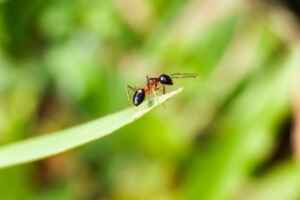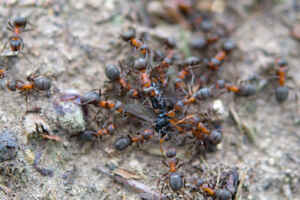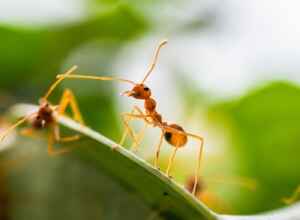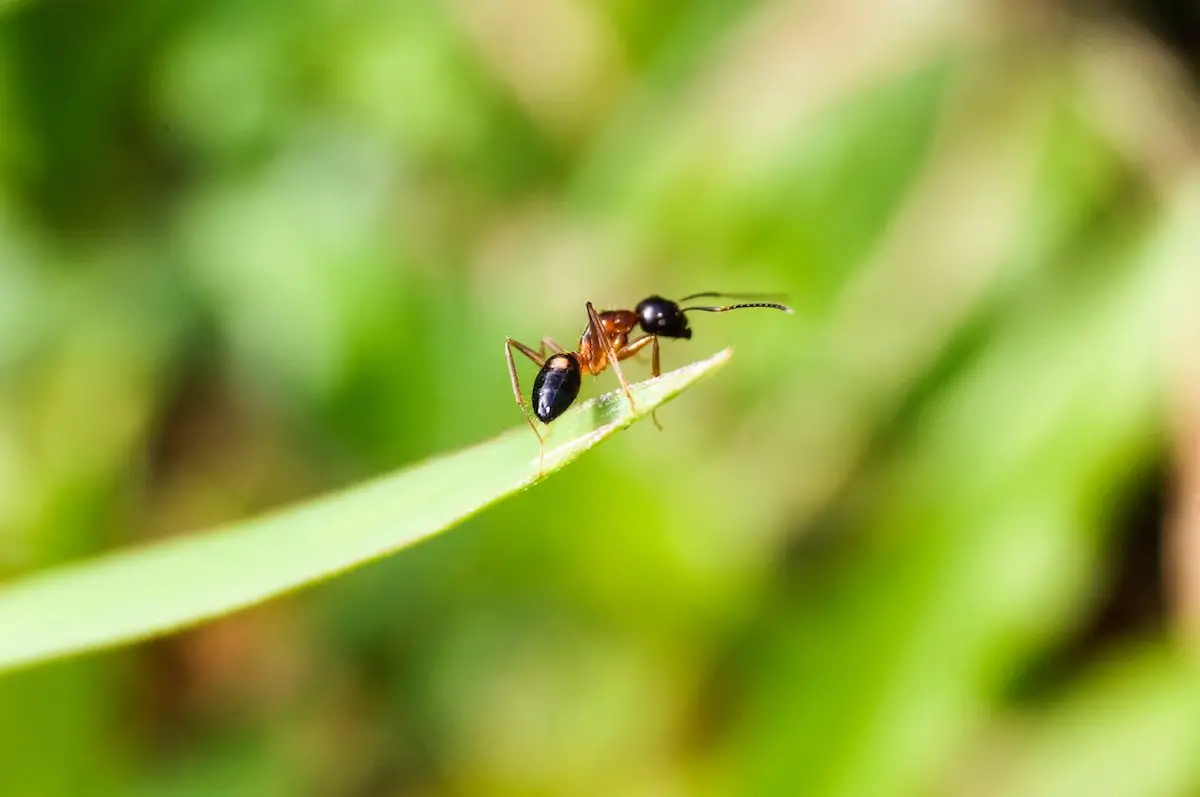We All Know That Ants Can Be a Pest
There are many different types of ants, and they can be a pest in your home or business. Some ants are harmless, but others can cause problems such as the carpenter ant, the fire ant, and the pharaoh ant. Another distinction between the different types of ants is that they all have different diets. So, do ants eat grass?
Yes, ants can eat grass. In fact, many species of ants are known to feed on plants and other vegetation. Some include the leafcutter ants, the harvester ants, and the grass-carrying ants. Ants are quite versatile eaters and will consume a wide variety of food sources and they do not only eat other insects.
In this blog post, we will be discussing all of these different ant species, their different diets, how they can affect your lawn and home, and how you can prevent this from happening. So to find all of this out and more, keep reading!

Types of Ants That Can Cause Problems
As stated before, with there being so many different types of ants, some are harmless, while others can cause lots of problems.
The most common type of ant in the United is the carpenter ant. Carpenter ants are black or red and range in size from a quarter inch to three-quarters inch long. They build their nests in wood which can be a problem in homes and businesses.
Another type of ant that can be a problem is the fire ant. Fire ants are red and range in size from one-eighth inch to one-half inch long. They build their nests in the ground and can be a problem in parks and playgrounds.
The last type of ant that can be a problem is the pharaoh ant. Pharaoh ants are yellow or light brown and range in size from a one-sixteenth inch to one-eighth inch long. They build their nests in walls, and can be a problem in hospitals and nursing homes.
However, this is not the only major distinction between different types of ants, as their diets differ as well. As some types of ants eat plants including grass, while other species either scavenge for food or feed on other insects.
Types of Ants That Eat Grass
The answer is yes, some ants do eat grass. One type of ant that is known to eat grass is the leafcutter ant. These ants live in South America and cut leaves from trees to bring them back to their nests. They then use the leaves to cultivate a fungus that they eat.
Other types of ants that may eat grass include harvester ants and grass-carrying ants. These ants collect seeds and other plant material to take back to their nests. They store the food in special chambers where it is used to feed the colony.
Do all ants eat grass? No, as mentioned earlier, there are many different types of ants with different diets. Some ants, such as fire ants, are actually harmful to plants and can cause damage to crops. So, it is important to know what type of ant you are dealing with before assuming that they will all eat grass.
Left Unchecked, They Can Ruin Your Yard
There are many ways that ants can ruin your yard. If you have a problem with ants, you may want to consider some of these solutions.
One way that ants can destroy your yard is by eating your plants. Ants are attracted to the sweet nectar in flowers and the sugar in fruits and vegetables. They will also eat the leaves of your plants, causing them to turn brown and die.
Another way that ants can damage your yard is by building their nests in it. Ants build their nests by digging tunnels underground. This can cause the soil to become loose and make it difficult for your plants to grow. Additionally, the tunnels can damage the roots of your plants, making them more susceptible to disease.
Finally, ants can also spread disease to your plants. Some ants are carriers of plant pathogens that can cause your plants to become sick. These diseases can be difficult to treat and can often kill your plants.
But There Are Some Benefits
There are many benefits to having ants in your yard. For one, they help aerate and turn over the soil, which is important for healthy plant growth. They also help control pests by preying on other insects, such as grubs and caterpillars. Additionally, their colonies can provide natural fertilizer for your plants. Some species of ants even help protect plants from disease.
While ants can be beneficial to your yard, it is important to keep their populations in check. If left unchecked, ants can become a nuisance, invading homes and gardens in search of food. Fortunately, there are a number of effective ant control methods you can use to keep them under control.

You Want to Keep Control
While they are not harmful to grass or pets, they can be a nuisance. You may be looking for ways to get rid of ants or control them without any harm to the grass you do have or your pets. Here are five ways to control ants in your yard:
1. Use an Insecticide
There are many different types of insecticides that can be used to kill ants. However, before using any type of insecticide, be sure to read the label carefully to make sure it will not harm your grass or pets.
2. Make a Homemade Ant Bait
This can be done by mixing sugar and borax together and placing it in a shallow dish. The ants will be attracted to the sugar and will take the borax back to their nest where it will kill them.
3. Create a Barrier
Another way to keep ants out of your yard is to create a barrier around the perimeter of your property. This can be done by using things like mulch, rocks, or even diatomaceous earth.
4. Use a Natural Repellent
There are many different types of natural repellents that can be used to keep ants away. Some of these include citrus oils, cinnamon, and cayenne pepper.
5. Hire a Professional Exterminator
If you have an infestation that is difficult to control, you may need to hire a professional exterminator. They will have the necessary equipment and knowledge to get rid of the ants for good.
Do Ant Hills Mean That My Yard Is In Trouble?
Not necessarily. Ant hills could just mean that the ants have found good soil where they can build their colony. However, it can be disheartening to see them on your lawn.
There are a few things that you can take into consideration when trying to determine whether or not ant hills in your yard are a cause for concern.
1. The Location of the Ant Hills
If they are close to your home, they could be a potential entry point for ants looking to invade your space.
2. The Size of the Ant Hills
If they seem to be getting bigger or more numerous, this could be an indication that there is a larger problem.
3. Pay Attention to Any Other Changes In Your Yard
Finally, you need to pay attention to any other changes in your yard that might be related to the appearance of the ant hills. For example, if you notice an increase in the number of ants in your yard, this could be another sign that something is wrong.

Ants Don’t Have to Be a Problem
Don’t let ants ruin what is left of your outdoor summer plans! Here are a few tips to keep them at bay:
– Use Ant Baits or Traps
These can be placed near areas where you’ve seen ants and will help to reduce the population.
– Keep Food and Garbage Properly Sealed
Ants are attracted to food, so make sure to keep all food in containers with tight-fitting lids.
– Eliminate Moisture Sources
Ants are attracted to moisture, so try to eliminate any potential sources of water in your home or yard. Fix any leaks, and make sure that gutters are draining properly.
– Trim Back Vegetation
Overgrown vegetation provides a perfect hiding place for ants, so trimming it back will help to reduce their population.
So In The End…
Yes, ants can eat grass. In fact, many species of ants are known to feed on plants and other vegetation. While some people believe that ants only eat insects, the truth is that they are quite versatile eaters and will consume a wide variety of food sources. So, if you see ants munching on your lawn, don’t be too alarmed – they’re just doing what comes naturally to them! Just make sure you keep the population under control.

